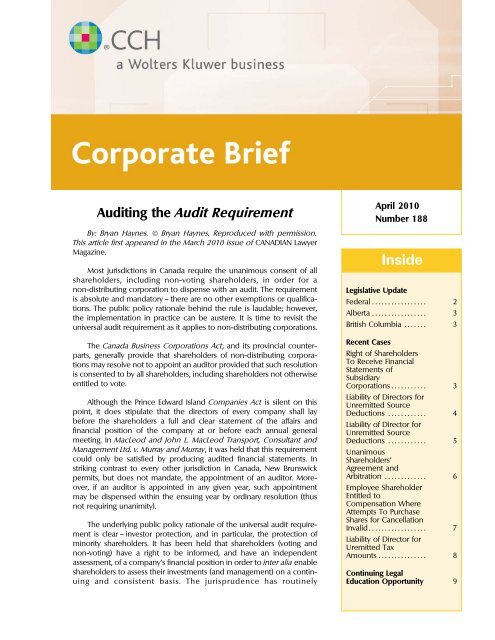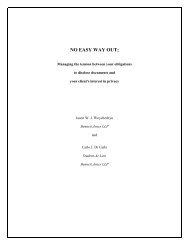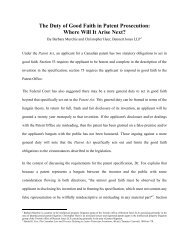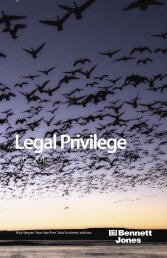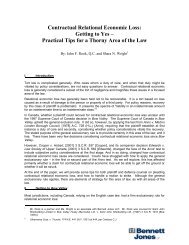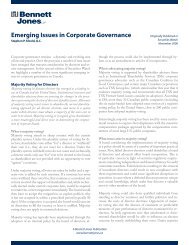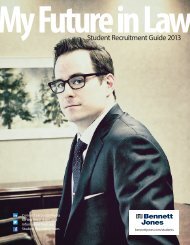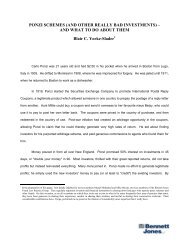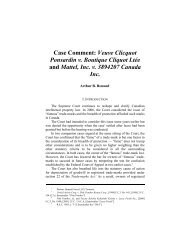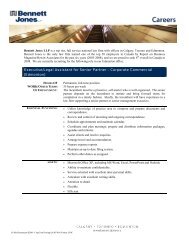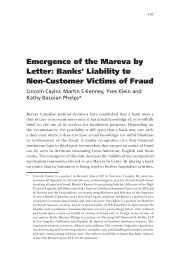Auditing the Audit Requirement - Bennett Jones
Auditing the Audit Requirement - Bennett Jones
Auditing the Audit Requirement - Bennett Jones
Create successful ePaper yourself
Turn your PDF publications into a flip-book with our unique Google optimized e-Paper software.
April 2010<strong><strong>Audit</strong>ing</strong> <strong>the</strong> <strong>Audit</strong> <strong>Requirement</strong>Number 188By: Bryan Haynes. © Bryan Haynes. Reproduced with permission.This article first appeared in <strong>the</strong> March 2010 issue of CANADIAN LawyerMagazine.InsideMost jurisdictions in Canada require <strong>the</strong> unanimous consent of allshareholders, including non-voting shareholders, in order for anon-distributing corporation to dispense with an audit. The requirement Legislative Updateis absolute and mandatory — <strong>the</strong>re are no o<strong>the</strong>r exemptions or qualifica- Federal ................. 2tions. The public policy rationale behind <strong>the</strong> rule is laudable; however,Alberta................. 3<strong>the</strong> implementation in practice can be austere. It is time to revisit <strong>the</strong>universal audit requirement as it applies to non-distributing corporations.British Columbia ....... 3The Canada Business Corporations Act, and its provincial counter-Recent Casesparts, generally provide that shareholders of non-distributing corpora- Right of Shareholderstions may resolve not to appoint an auditor provided that such resolutionTo Receive FinancialStatements ofis consented to by all shareholders, including shareholders not o<strong>the</strong>rwiseSubsidiaryentitled to vote. Corporations........... 3Liability of Directors forAlthough <strong>the</strong> Prince Edward Island Companies Act is silent on thisUnremitted Sourcepoint, it does stipulate that <strong>the</strong> directors of every company shall lay Deductions ............ 4before <strong>the</strong> shareholders a full and clear statement of <strong>the</strong> affairs andLiability of Director forfinancial position of <strong>the</strong> company at or before each annual general Unremitted Sourcemeeting. In MacLeod and John L. MacLeod Transport, Consultant and Deductions ............ 5Management Ltd. v. Murray and Murray, it was held that this requirement Unanimouscould only be satisfied by producing audited financial statements. In Shareholders’striking contrast to every o<strong>the</strong>r jurisdiction in Canada, New Brunswick Agreement andpermits, but does not mandate, <strong>the</strong> appointment of an auditor. Moreover,Arbitration ............. 6if an auditor is appointed in any given year, such appointment Employee Shareholdermay be dispensed within <strong>the</strong> ensuing year by ordinary resolution (thus Entitled tonot requiring unanimity).Compensation WhereAttempts To PurchaseShares for CancellationThe underlying public policy rationale of <strong>the</strong> universal audit require-Invalid.................. 7ment is clear — investor protection, and in particular, <strong>the</strong> protection ofLiability of Director forminority shareholders. It has been held that shareholders (voting andUremitted Taxnon-voting) have a right to be informed, and have an independent Amounts ............... 8assessment, of a company’s financial position in order to inter alia enableshareholders to assess <strong>the</strong>ir investments (and management) on a contin- Continuing Legaluing and consistent basis. The jurisprudence has routinely Education Opportunity 91
Corporate Brief 2confirmed and upheld <strong>the</strong> sanctity of this right (includingMerrill v. Afab Security, Chrisger Systems Inc.; LabattBrewing Co. v. Trilon Holdings Inc.; Smith v. ECO GroutingSpecialists Ltd.; Runnalls v. Regent Holdings Ltd.; Barbour v.Jamestown Lumber Co.). In Discovery Enterprises Inc. v.ISE Research Ltd., it was noted: ‘‘The refusal of a companyto deliver audited financial statements can serve to hide<strong>the</strong> true financial position from a minority shareholder.’’However, universal application of this onerous requirementcan have unintended and severe consequences, par-ticularly on small, privately held corporations. Often, anaudit is unnecessary or prohibitively expensive and dispro-portionate to <strong>the</strong> financial resources of <strong>the</strong> company and<strong>the</strong> value of a shareholder’s investment. <strong>Audit</strong>s can costtens of thousands of dollars and paying <strong>the</strong> cost of an auditcan leave a company with reduced or no profits to distributeto shareholders, or worse yet, fur<strong>the</strong>r indebted.Ironically, <strong>the</strong> very application of <strong>the</strong> principle that isintended to protect shareholders’ investments could in factjeopardize <strong>the</strong>m.Since dispensing with an auditor requires unanimousconsent, <strong>the</strong> fate of a company, and every o<strong>the</strong>r shareholder’sinvestment (and return on same) in that company,could rest in <strong>the</strong> hands of a single shareholder regardless ofsuch shareholder’s status as a voting or non-voting share-holder and regardless of <strong>the</strong> size of such shareholder’sCORPORATE BRIEFCanada’s ironclad audit requirement is ill-suited,imbalanced, and disproportionate for countless small, pri-vate companies. A better balance between <strong>the</strong> rights ofminority and majority shareholders is called for.Published monthly as <strong>the</strong> newsletter complement to <strong>the</strong> CANADACORPORATIONS LAW REPORTER, <strong>the</strong> ALBERTA CORPORATIONS LAW GUIDE,<strong>the</strong> BRITISH COLUMBIA CORPORATIONS LAW GUIDE, <strong>the</strong> CANADIANCORPORATE SECRETARY’S GUIDE and <strong>the</strong> ONTARIO CORPORATIONS LAWGUIDE, by CCH Canadian Limited. For subscription information,see your CCH Account Manager or call 1-800-268-4522 or (416)224-2248 (Toronto).For CCH Canadian Limited:CASSANDRA WATSON, B.A., LL.B., Writer(416) 224-2224, ext. 6357e-mail: cassandra.watson@wolterskluwer.cominvestment. As much as it may be unfair to a minorityshareholder to deny an independent assessment of a company’sfinancial statement, it is equally, perhaps more,unfair to <strong>the</strong> remaining majority shareholders to endure<strong>the</strong> consequences of such an assessment if o<strong>the</strong>rwiseunnecessary or uneconomical.The case law has held that a shareholder’s motive in,and <strong>the</strong> financial consequences of, requiring an audit areirrelevant. Struck with <strong>the</strong> unwavering harshness of this rule,some judges have rightly tried to alleviate its ramifications.In Barbour, Justice Handrigan wrote: ‘‘I took this limitationinto account by restricting <strong>the</strong> audit to JamestownLumber’s most recent fiscal period. It would, in <strong>the</strong> circumstanceshere, be an unfair and unnecessary expense to <strong>the</strong>corporation and ultimately for its o<strong>the</strong>r shareholders tobear to require an audit for any longer period.’’When compared with o<strong>the</strong>r leading corporate lawjurisdictions, Canada’s model of universality is draconian.Some American states (including New York and Delaware)do not require audited financial statements of private com-panies. In both <strong>the</strong> United Kingdom and Australia, statutoryexemptions from audit requirements, based on revenues,assets, and number of employees, are provided to smallprivate companies. However, notwithstanding that a com-pany may o<strong>the</strong>rwise qualify for exemption from auditrequirements, members (voting and non) of U.K. companiesrepresenting at least 10 per cent of <strong>the</strong> nominal valueof a company’s share capital, and voting shareholders ofAustralian companies holding at least five per cent of <strong>the</strong>votes, may demand an audit.Bryan Haynes (haynesb@bennettjones.com) is apartner and co-chairman of <strong>the</strong> commercial transactionspractice group at <strong>Bennett</strong> <strong>Jones</strong> LLP.ADEELA AHMAD, B.A., Editor(416) 224-2224, ext. 6262LEGISLATIVE UPDATEe-mail: adeela.ahmad@wolterskluwer.comIVER CHONG, B.A., B.Ed., Associate Editor(416) 224-2224, ext. 6278e-mail: Iver.Chong@wolterskluwer.comNATALIE MEDITSKY, B.A.A, Editor(416) 224-2224, ext. 6246Federale-mail: natalie.meditsky@wolterskluwer.comSOR/2010-72, Regulations Amending Certain Depart-SHIRLEY SPALDING, B.A., Associate Editor(416) 224-2224, ext. 6211ment of Industry Regulations, came into force on March 25,e-mail: Shirley.Spalding@wolterskluwer.com 2010.The changes affect Part 2 of <strong>the</strong> regulations under <strong>the</strong>Canada Business Corporations Act and Part 2 of <strong>the</strong> regu-lations under <strong>the</strong> Canada Cooperatives Act which bothdeal with name granting requirements. The objective of <strong>the</strong>changes is to clarify <strong>the</strong> rules regarding <strong>the</strong> names of corporationsand cooperatives. O<strong>the</strong>r than a new sectionallowing more flexibility in naming a corporation or cooperativeresulting from a short-form amalgamation, <strong>the</strong> pro-CHERYL FINCH, B.A., LL.B., Director of EditorialLegal and Business Markets(416) 228-6128e-mail: Cheryl.Finch@wolterskluwer.com© 2010, CCH Canadian Limited90 Sheppard Ave. East, Suite 300Toronto, Ontario M2N 6X1Tel: (416) 224-2224Fax: (416) 224-0729
3Corporate Briefposed changes do not make substantive changes to <strong>the</strong> Financial Institutions Act, sections 215.1 and 215.2, whichname granting regulations. Instead, <strong>the</strong> regulations have deal with extrajurisdictional evidence, and section 219.1,been revised to be clearer and easier to read and to which deals with <strong>the</strong> collection and sharing of informationaddress concerns raised by <strong>the</strong> Standing Joint Committee regarding financial institutions.on <strong>the</strong> Scrutiny of Regulations regarding <strong>the</strong> wording of <strong>the</strong>regulations.Sections 4, 5, 9, 10, 12 to 14, 15(b), 20, 25, 26(b), 28(b),34 to 37, and 43 to 50 have not yet been proclaimed.These regulatory changes will be incorporated into <strong>the</strong> Section 14 <strong>the</strong> Act will add a new division to Part 4 of <strong>the</strong>CANADA CORPORATIONS LAW REPORTER.Financial Institutions Act. Division 2.1, ‘‘Actuaries — InsuranceCompanies’’, contains new sections 126.1 to 126.31.Jobs and Economic Growth Act, Bill C-9 received first Section 45 of <strong>the</strong> Act will add, to <strong>the</strong> Personal Propertyreading on March 29, 2010. Bill C-9 affects various Acts, Security Act, sections 7.2 to 7.6, which deal with transition.including:These statutory changes will be incorporated into <strong>the</strong>● The Financial Consumer Agency of Canada Act which is BRITISH COLUMBIA CORPORATIONS LAW GUIDE.amended to provide <strong>the</strong> Financial Consumer Agency ofCanada with a broader oversight role to allow it to verifycompliance with ministerial undertakings and directions.The amendments also increase <strong>the</strong> Agency’s ability toRECENT CASESundertake research, including research on trends andemerging consumer protection issues;● ● ● Nova Scotia Court of Appeal ● ● ●Minas BasinHoldings Ltd. (‘‘Minas Basin’’) was a private company, 99%of <strong>the</strong> shares of which were held by a single majority shareholder,while less than 1% of shares were held by minorityshareholders. The majority shareholder had attempted topurchase <strong>the</strong> holdings of <strong>the</strong> minority under a Plan ofArrangement, but dissent by some of <strong>the</strong> minority meantthat an independent valuation of <strong>the</strong> shares would havebeen required and <strong>the</strong> company abandoned <strong>the</strong> plan. Therespondent, who was one of <strong>the</strong> minority shareholders,requested that <strong>the</strong> company permit him to examine <strong>the</strong>financial statements of Minas Basin’s various subsidiarycompanies. By way of response, Minas Basin filed an applicationseeking an order under <strong>the</strong> Companies Act (<strong>the</strong>‘‘Act’’) barring <strong>the</strong> right of <strong>the</strong> applicant shareholder fromexamining <strong>the</strong> financial statements in question (seeONTARIO CORPORATIONS LAW GUIDE 51,504, CANADA CORPORA-TIONS LAW REPORTER 200,848, ALBERTA CORPORATIONS LAW GUIDE79,267, CANADIAN CORPORATE SECRETARY’S GUIDE 51,128, andBritish Columbia Law Guide 78,691). The application wasdismissed, <strong>the</strong> Court holding that <strong>the</strong> company had notmet <strong>the</strong> onus of showing that detriment would result fromproviding shareholders with access o<strong>the</strong>rwise permitted bystatute. The Court held that <strong>the</strong>re was no suggestion that<strong>the</strong> shareholder request for information was connectedwith any illegal or improper purpose, and that <strong>the</strong> assessmentof corporate financial documents was a legitimateshareholder exercise. In light of <strong>the</strong> company’s concerns,<strong>the</strong> Court’s decision included an order binding <strong>the</strong> shareholderto share information provided only with hisaccountant and/or his solicitor. The company appealedfrom <strong>the</strong> decision of applications judge.● The Proceeds of Crime (Money Laundering) and TerroristFinancing Act which is amended to confer on <strong>the</strong>Minister of Finance <strong>the</strong> power to issue directivesimposing measures with respect to certain financialtransactions. The amendments also confer on <strong>the</strong> Gov-ernor in Council <strong>the</strong> power to make regulations that limitor prohibit certain financial transactions; and●The Bank Act and o<strong>the</strong>r related statutes which areamended to provide a framework to enable creditunions to incorporate and continue as banks. The modelis based on <strong>the</strong> framework applicable to o<strong>the</strong>r federallyregulated financial institutions, adjusted to give effect tocooperative principles and governance.AlbertaBill 13, <strong>the</strong> Securities Amendment Act, 2010, receivedfirst reading on March 18, 2010 and second reading onMarch 25, 2010. Bill 13 proposes amendments to <strong>the</strong>Securities Act and to <strong>the</strong> Securities Amendment Act, 2006.These statutory changes will be incorporated into <strong>the</strong>ALBERTA CORPORATIONS LAW GUIDE.British ColumbiaThe appeal was dismissed. The company based itsappeal on three grounds. First, it alleged that <strong>the</strong> applica-tions judge had erred by adopting a narrow and strict viewof <strong>the</strong> meaning of ‘‘detriment’’, by requiring <strong>the</strong> companyto establish ‘‘undue’’ detriment, and by failing to engage ina balancing of <strong>the</strong> detriment to <strong>the</strong> company, financial andS.B.C. 2010, c. 4, formerly Bill 6, <strong>the</strong> Financial StatutesAmendment Act (<strong>the</strong> ‘‘Act’’), which amends <strong>the</strong> FinancialInstitutions Act, <strong>the</strong> Personal Property Security Act, and <strong>the</strong>Securities Act, received Royal Assent on March 31, 2010, onwhich date sections 3(a), 8, 16, 29, 30, and 33 of <strong>the</strong> Actcame into force.Sections 3(b) and (c), 6, 7, 11, 15(a), 17 to 19, 21 to 24,26(a), 27, 28(a), 31, and 32 come into force onDecember 31, 2010. Section 23 of <strong>the</strong> Act will add, to <strong>the</strong>Right of Shareholders To Receive FinancialStatements of Subsidiary Corporations
Corporate Brief 4o<strong>the</strong>rwise, against what <strong>the</strong> shareholder might benefit from<strong>the</strong> requested disclosure. It also alleged that <strong>the</strong> applica-tions judge had erred in finding that disclosure would notresult in detriment to <strong>the</strong> company.The Court of Appeal began by reviewing <strong>the</strong> commen-tary on <strong>the</strong> two-fold purpose of shareholder disclosure.The first purpose is to permit <strong>the</strong> shareholders and <strong>the</strong>securities market generally to evaluate <strong>the</strong> relative strengthsand weaknesses of an enterprise, in order to makeinformed decisions with respect to investments. Second,<strong>the</strong> provision of adequate information allows shareholdersto effectively evaluate <strong>the</strong> performance of <strong>the</strong> corporation’sdirectors and officers. The Court noted that in this case, <strong>the</strong>respondent was not asking for information which wouldgenerally not be available to a shareholder. Ra<strong>the</strong>r, he wasseeking to examine <strong>the</strong> financial statements of <strong>the</strong> parent’ssubsidiary companies, which <strong>the</strong> parent was required bystatute to keep at its registered office, and which shareholderswere entitled to inspect at <strong>the</strong> annual generalmeeting. The Court was not convinced that <strong>the</strong> applicationsjudge made an error of law. In <strong>the</strong> Court’s view, <strong>the</strong>question before <strong>the</strong> applications judge was not <strong>the</strong> precisedelineation of <strong>the</strong> meaning of <strong>the</strong> term ‘‘detriment’’, butwhe<strong>the</strong>r <strong>the</strong> appellant company had met its onus of establishingdetriment which would warrant <strong>the</strong> granting of reliefagainst disclosure of <strong>the</strong> subsidiary financial statements.The Court of Appeal concluded that <strong>the</strong> applications judgehad not unduly narrowed <strong>the</strong> definition of detriment andfur<strong>the</strong>r, that he had not committed an error by failing toengage in a balancing of any detriment to <strong>the</strong> companyagainst potential benefit to <strong>the</strong> shareholder. There was, in<strong>the</strong> Court’s view, no basis in <strong>the</strong> statutory language to support<strong>the</strong> view that <strong>the</strong> applications judge was required toengage in such a balancing type test. Ra<strong>the</strong>r, <strong>the</strong> judge isrequired simply to assess <strong>the</strong> evidence to determine if <strong>the</strong>requested disclosure would be detrimental to <strong>the</strong> companyor a subsidiary. The applications judge carried outsuch an assessment and, in doing so, he committed noreviewable error of law.The Court of Appeal <strong>the</strong>n considered whe<strong>the</strong>r, asalleged by <strong>the</strong> appellant, <strong>the</strong> applications judge had erredin concluding that <strong>the</strong> company had not met <strong>the</strong> onus ofshowing detriment. The appellant company alleged that<strong>the</strong> applications judge had erred by concluding that <strong>the</strong>rewas no evidence that <strong>the</strong> shareholder would disclosefinancial information which he received, and had alsoerred in failing to recognize that <strong>the</strong> shareholder wasseeking subsidiary financial information for an improperpurpose. The Court of Appeal rejected both allegations.The shareholder, in his testimony, had indicated that hewould share any information received with his legaladvisers and accountants. The applications judge wasaware of this testimony and imposed a condition on <strong>the</strong>shareholder prohibiting him from sharing any informationreceived with anyone else. The Court of Appeal found itnoteworthy that <strong>the</strong> shareholder had not appealed againstthat confidentiality order and also that it was not suggestedthat he had breached its terms. With respect to <strong>the</strong> allegedimproper purpose, <strong>the</strong> Court of Appeal held that <strong>the</strong>statute clearly gave <strong>the</strong> shareholder <strong>the</strong> right to examineand make copies of financial statements of <strong>the</strong> company’ssubsidiaries, unless <strong>the</strong> company could obtain relief from acourt. The shareholder is not required to satisfy <strong>the</strong> com-pany of <strong>the</strong> legitimacy of his request or to negotiate anyterms under which he may be given access. Ra<strong>the</strong>r, it is <strong>the</strong>company which bears <strong>the</strong> onus of persuading <strong>the</strong> Courtthat providing <strong>the</strong> shareholder with his statutory rightwould cause detriment to <strong>the</strong> company or to its subsidi-aries. The applications judge found that it did not meet thatonus, and <strong>the</strong>re was no basis for a finding of error in hisreasons for doing so.Minas Basin Holdings Limited v. Paul Bryant EnterprisesLtd. and <strong>the</strong> Registrar of Joint Stock CompaniesALBERTA CORPORATIONS LAW GUIDE 79,326BRITISH COLUMBIA CORPORATIONS LAW GUIDE 78,750CANADA CORPORATIONS LAW REPORTER 200,907CANADIAN CORPORATE SECRETARY’S GUIDE 51,187ONTARIO CORPORATIONS LAW GUIDE 51,563Liability of Directors for Unremitted SourceDeductions● ● ● Ontario Court of Appeal ● ● ●A company knownas Danso Enterprises Ltd. (‘‘Danso Enterprises’’) was incor-porated in 1997 by <strong>the</strong> bro<strong>the</strong>r of <strong>the</strong> applicant LisaDanso-Coffey (‘‘Danso-Coffey’’), and she was named adirector of <strong>the</strong> corporation without her knowledge.Danso-Coffey was not involved in <strong>the</strong> incorporation of <strong>the</strong>company and never signed any forms or paperwork inrelation to <strong>the</strong> company’s incorporation or operations.While shares of <strong>the</strong> company were placed in her name,she never received any of those shares. She was neveremployed by <strong>the</strong> company, never had any operationalinvolvement, and never received any income or benefitsfrom <strong>the</strong> company. In 2004, <strong>the</strong> company became insol-vent and eventually filed for bankruptcy. An assessmentwas issued against Danso-Coffey with respect to retail salestax that <strong>the</strong> corporation had failed to remit. She brought anapplication for a declaration that she was not a director of<strong>the</strong> company and <strong>the</strong>refore not liable for assessment (seeONTARIO CORPORATIONS LAW GUIDE 51,497, CANADA CORPORA-TIONS LAW REPORTER 200,841, ALBERTA CORPORATIONS LAW GUIDE79,260, CANADIAN CORPORATE SECRETARY’S GUIDE 51,121, andBritish Columbia Law Guide 78,684). It was held that affi-davit evidence established that Danso-Coffey had neverbeen a director of <strong>the</strong> company. The Business Corpora-tions Act (<strong>the</strong> ‘‘Act’’) required that a director be elected by<strong>the</strong> shareholders and that <strong>the</strong> director consent to his or herappointment in writing. Nei<strong>the</strong>r statutory requirement hadbeen satisfied and Danso-Coffey was <strong>the</strong>refore not adirector. The Court possessed inherent and statutory dis-cretion to grant declaratory relief to Danso-Coffey and suchrelief was granted. The Crown appealed from that decision.
5Corporate BriefThe appeal was allowed. The Court of Appeal held that<strong>the</strong>re were several issues to be determined on <strong>the</strong> appeal,and it identified <strong>the</strong> following as issues for determination.First, whe<strong>the</strong>r <strong>the</strong> Minister’s assessment of Danso-Coffeywas ‘‘unlawful’’; whe<strong>the</strong>r <strong>the</strong>re was a gap within <strong>the</strong> legisla-tion which prevented her from seeking relief within <strong>the</strong>parameters of <strong>the</strong> taxing statute; whe<strong>the</strong>r, if <strong>the</strong>re was nosuch gap, <strong>the</strong> Court possessed <strong>the</strong> jurisdiction to providedeclaratory relief; and, finally, whe<strong>the</strong>r, if such jurisdictionexisted, <strong>the</strong> applications judge had correctly exercised thatdiscretion.company. That conclusion did not, however, invalidate <strong>the</strong>original assessment, as <strong>the</strong> taxing statute provided that anyassessment issued was deemed to be valid despite anyerror or omission contained within it. As <strong>the</strong> original assessmentwas valid, <strong>the</strong> Minister’s appeal was allowed and <strong>the</strong>declaration that Danso-Coffey was not a director wasupheld. However, <strong>the</strong> Court of Appeal noted that <strong>the</strong> dec-laration that Danso-Coffey was never a director of <strong>the</strong> cor-poration meant that <strong>the</strong> factual basis on which <strong>the</strong> assess-ment was made no longer existed. Consequently, it wasopen to Danso-Coffey to request that <strong>the</strong> Minister reassessher, taking into account her due diligence defence basedon her mistaken belief that she was not listed as a directorof <strong>the</strong> company.The Court first considered <strong>the</strong> issues relating to <strong>the</strong>assessment under <strong>the</strong> sales tax legislation, and <strong>the</strong> questionof whe<strong>the</strong>r Danso-Coffey was entitled to seek reliefwithin <strong>the</strong> parameters of that statute. It held that <strong>the</strong> trialjudge had erred in finding that <strong>the</strong> assessment wasunlawful. In <strong>the</strong> Court of Appeal’s view, it appeared that <strong>the</strong>ALBERTA CORPORATIONS LAW GUIDE 79,327Minister was under <strong>the</strong> impression that in lawDanso-Coffey could not raise <strong>the</strong> defence that she hadBRITISH COLUMBIA CORPORATIONS LAW GUIDE 78,751never been a director and so it issued <strong>the</strong> Notice of Assessment.There was no allegation that <strong>the</strong> Minister abused itsCANADA CORPORATIONS LAW REPORTER 200,908power or that Danso-Coffey’s objection was not taken intoaccount. The assessment was validly issued, and <strong>the</strong> trial CANADIAN CORPORATE SECRETARY’S GUIDE 51,188judge’s conclusion that it was unlawful was in error. Theappellate Court <strong>the</strong>n considered whe<strong>the</strong>r, as found by <strong>the</strong> ONTARIO CORPORATIONS LAW GUIDE 51,564trial judge, <strong>the</strong>re was a ‘‘functional gap’’ in <strong>the</strong> legislationwhich prevented Danso-Coffey from raising <strong>the</strong> defencethat she had never been a director of <strong>the</strong> corporation, andconcluded that no such functional gap existed. The Court● ● ● Tax Court of Canada ● ● ●The appellant WilliamCampbell (‘‘Campbell’’) was <strong>the</strong> sole director and share-holder of a business, Complete Rent-Alls Limited (‘‘CRL’’).While CRL had been successful for 25 years, it began toexperience financial difficulties in <strong>the</strong> late 1980s. Until thattime, Campbell had been involved primarily in <strong>the</strong> man-agement of CRL but when financial problems occurred, hebecame involved at all levels of <strong>the</strong> business. In 1994, CRLmade a proposal in bankruptcy which was accepted by itscreditors, including <strong>the</strong> Canada Revenue Agency (‘‘CRA’’).Before making <strong>the</strong> proposal, and for about two years afterthat time, <strong>the</strong> company had met substantially all of itsremittance obligations. Difficulties with source deductionsbegan in 1996. Steps were taken to address <strong>the</strong> problem,but CRL eventually ceased operations in 1999. Campbellhad remained <strong>the</strong> sole director of <strong>the</strong> company untilDecember 31, 2000, at which time he indicated that he hadresigned that position by means of a handwritten letter.Notwithstanding, in 2006 <strong>the</strong> CRA issued an assessmentagainst him for source deductions owed by CRL. Campbellappealed against <strong>the</strong> assessment.reviewed <strong>the</strong> jurisprudence with respect to a defence ofdue diligence and found that such defence could include‘‘holding a reasonable belief in a mistaken set of facts’’. Inthis case, although Danso-Coffey reasonably believed thatshe was not listed as a director of her bro<strong>the</strong>r’s company,she was mistaken. Such reasonable belief would satisfy <strong>the</strong>requirements of a due diligence defence, andDanso-Coffey could have raised such defence to an assessmentunder <strong>the</strong> taxing statute. Finally, <strong>the</strong> Court consideredwhe<strong>the</strong>r <strong>the</strong> trial judge had erred in exercising his inherentdiscretion to grant declaratory relief, and concluded tha<strong>the</strong> had. The Court held that, in considering whe<strong>the</strong>r <strong>the</strong>court has jurisdiction to grant declaratory relief outside <strong>the</strong>statutory framework, regard must be had to <strong>the</strong> purpose of<strong>the</strong> legislation and its wording. A functional gap in <strong>the</strong>legislation would be an example of a jurisprudential reasonfor <strong>the</strong> court to exercise its inherent jurisdiction. However,<strong>the</strong> Court had found that no such functional gap existedand <strong>the</strong>re was <strong>the</strong>refore no justification for <strong>the</strong> trial judge’sexercise of inherent jurisdiction. The Court of Appeal con-cluded that <strong>the</strong> legislature intended disputes concerning<strong>the</strong> validity of an assessment of tax to be resolved within<strong>the</strong> framework of <strong>the</strong> taxing statute.Danso-Coffey v. Her Majesty <strong>the</strong> Queen in Right ofOntarioLiability of Director for Unremitted SourceDeductionsThe appeal was allowed. Campbell disputed <strong>the</strong>validity of <strong>the</strong> assessment on <strong>the</strong> basis that, since he hadresigned his position as CRL’s director in 2000, <strong>the</strong> assess-ment had been issued outside <strong>the</strong> statutory two-year limitationperiod provided for in <strong>the</strong> Income Tax Act (<strong>the</strong>‘‘Act’’). In <strong>the</strong> alternative, Campbell took <strong>the</strong> position tha<strong>the</strong> had, as required by <strong>the</strong> Act, exercised <strong>the</strong> necessary dueThe Court of Appeal <strong>the</strong>n considered <strong>the</strong> question ofwhe<strong>the</strong>r <strong>the</strong> trial judge was correct in his conclusions thatDanso-Coffey was never a director of <strong>the</strong> corporation. On<strong>the</strong> basis of <strong>the</strong> unchallenged evidence concerningDanso-Coffey’s lack of involvement with <strong>the</strong> corporation,<strong>the</strong> Court saw no reason to interfere with <strong>the</strong> applicationjudge’s declaration that she was never a director of <strong>the</strong>
Corporate Brief 6diligence to prevent <strong>the</strong> failures to remit <strong>the</strong> required CANADA CORPORATIONS LAW REPORTER 200,909source deductions to <strong>the</strong> CRA.CANADIAN CORPORATE SECRETARY’S GUIDE 51,189The Court first examined <strong>the</strong> question of whe<strong>the</strong>rCampbell had in fact resigned his position as director in ONTARIO CORPORATIONS LAW GUIDE 51,565December 2000. The evidence showed that <strong>the</strong>re weretwo separate handwritten letters of resignation which hadbeen filed with <strong>the</strong> Registrar of Deeds. However, nei<strong>the</strong>r Unanimous Shareholders’ Agreement andletter had been properly filed or date-stamped and so it Arbitrationwas not possible to determine when <strong>the</strong>y had beenwritten. The Court reviewed <strong>the</strong> requirements which were ● ● ● Manitoba Court of Appeal ● ● ●James Courtimposed under <strong>the</strong> applicable provincial legislation with (‘‘Court’’), Christos Filopoulos (‘‘Filopoulos’’) and Brianrespect to a director’s resignation. While in most circumaccountingHnatiuk (‘‘Hnatiuk’’) were members of a professionalstances, it is not necessary for a resigning director to file <strong>the</strong>practice. They entered into a partnership agree-letter of resignation with <strong>the</strong> provincial corporate registry, ment (‘‘PA’’) and <strong>the</strong>y and <strong>the</strong>ir respective corporationsdifferent considerations apply where <strong>the</strong> company from also became parties to a unanimous shareholders’ agree-which <strong>the</strong> director is resigning is a tax debtor. Newfoundthroughment (‘‘USA’’). The accounting practice was carried onland and Labrador corporations legislation contains a prowhicha professional corporation (<strong>the</strong>‘‘corporation’’)vision requiring <strong>the</strong> director of such a company who seekswas also a party to <strong>the</strong> USA.to resign his or her position to advise <strong>the</strong> CRA of thatresignation. The Court reviewed <strong>the</strong> circumstances of Soon after forming <strong>the</strong> partnership, differences aroseCampbell’s purported resignation and concluded that among <strong>the</strong> parties and, in March 2007, Court and Filoclearevidence as to <strong>the</strong> date of such resignation was poulos decided to end <strong>the</strong> professional relationship withlacking. The onus was on Campbell to adduce evidence in Hnatiuk. They served notices on him under both <strong>the</strong> PAsupport of <strong>the</strong> au<strong>the</strong>nticity of <strong>the</strong> letter of resignation, and and <strong>the</strong> USA, bringing <strong>the</strong> relationship to an end. The<strong>the</strong> Court concluded that he had not done so. As well, notice given under <strong>the</strong> USA also stated that Court andeven if he had validly resigned on December 31, 2000, <strong>the</strong> Filopoulos were exercising <strong>the</strong>ir right to have <strong>the</strong> corpora-Court was of <strong>the</strong> opinion that he remained a de facto tion purchase <strong>the</strong> shares held by Hnatiuk and his corporadirectorof CRL after that date. Campbell had not informed tion. The USA contained a provision respecting a sharethird-party creditors or <strong>the</strong> CRA that he had resigned, ei<strong>the</strong>r valuation process, but this process was not followed.in <strong>the</strong> course of a pre-assessment proposal in 2004 or Shortly <strong>the</strong>reafter, Hnatiuk and his corporation applied forduring meetings held in 2005.an order liquidating <strong>the</strong> professional corporation. They alsosought a declaration that, under <strong>the</strong> terms of <strong>the</strong> USA, <strong>the</strong>yHaving concluded that Campbell had not resigned as were entitled to a one-third share of <strong>the</strong> assets of <strong>the</strong>director in December 2000, <strong>the</strong> Court went on to consider corporation and that <strong>the</strong> valuation and accounting proce-whe<strong>the</strong>r he had, in his actions as director, exercised <strong>the</strong> dures set out in <strong>the</strong> USA had to be followed. The o<strong>the</strong>r twonecessary due diligence. It noted that <strong>the</strong> jurisprudence parties applied for a stay of <strong>the</strong> liquidation application onprovides for an objective/subjective test, under which a <strong>the</strong> basis that <strong>the</strong> matter was, under <strong>the</strong> terms of <strong>the</strong> USA,due diligence defence is a question of fact to be deterthatto be submitted to arbitration. The applications judge heldmined with reference to <strong>the</strong> personal knowledge, skills andwhile <strong>the</strong> overriding issue was <strong>the</strong> valuation of Hna-experience of <strong>the</strong> individual director, toge<strong>the</strong>r with <strong>the</strong> tiuk’s interests and <strong>the</strong> valuation of those interests, <strong>the</strong>positive steps and actions that were taken to prevent <strong>the</strong> issue before him was whe<strong>the</strong>r to grant <strong>the</strong> stay. He heldremittance shortfalls. In this case, evidence of <strong>the</strong> steps that <strong>the</strong> arbitration clause included in <strong>the</strong> USA was suffi-taken was provided by Campbell and by <strong>the</strong> former chief ciently broad to include <strong>the</strong> issue in dispute and <strong>the</strong> stayfinancial officer of CRL. That evidence showed that Campthatwas granted. Hnatiuk and his corporation appealed frombell had taken all of <strong>the</strong> actions outlined in <strong>the</strong> case lawstay.required to establish a due diligence defence. He had alsotaken most of <strong>the</strong> steps which <strong>the</strong> CRA had identified in a The appeal was allowed in part. The first issue forCRA policy document as those which could be taken by a determination by <strong>the</strong> Court of Appeal was whe<strong>the</strong>r to givedirector to prevent remittance failure. In <strong>the</strong> Court’s view, effect to <strong>the</strong> respondents’ argument that section 7 of <strong>the</strong>Campbell had, throughout <strong>the</strong> entire period, involved himlowerArbitration Act applied to preclude any appeal from <strong>the</strong>self directly with a hands-on, proactive approach inCourt’s decision. The appellate Court reviewed <strong>the</strong>attempting to secure and comply with payment of CRL’s jurisprudence interpreting that section before concludingremittances. The Court concluded that Campbell was, as a that an appeal was possible. In <strong>the</strong> Court’s view, <strong>the</strong> appli-result, entitled to avail himself of <strong>the</strong> due diligence cations judge misdirected himself on <strong>the</strong> nature of <strong>the</strong>defence, and his appeal was <strong>the</strong>refore allowed.dispute, and it <strong>the</strong>refore followed that appellate interven-tion for <strong>the</strong> purpose of properly characterizing <strong>the</strong> disputeCampbell v. Her Majesty <strong>the</strong> Queen was not barred by subsection 7(6). Fur<strong>the</strong>r, a failure tointervene, by construing section 7 too literally, would resultALBERTA CORPORATIONS LAW GUIDE 79,328in an ineffective arbitration process. The arbitrator wouldhave to focus on a subsidiary question only, while <strong>the</strong>BRITISH COLUMBIA CORPORATIONS LAW GUIDE 78,752fundamental dispute remained outside his or her purview.
7Corporate BriefSuch a result could not, in <strong>the</strong> Court’s view, have been dant Reuben Rivas (‘‘Rivas’’), who controlled Venture,what was intended by <strong>the</strong> legislature in enacting section 7. entered into a shareholders’ agreement with Link andA discretionary order which stays a court proceeding and o<strong>the</strong>r executives of <strong>the</strong> company (<strong>the</strong> ‘‘managementrefers a dispute to arbitration cannot be immune from shareholders’’). Under that agreement, Link received sharesappellate review if failure to review would send a wrongly representing 9% of <strong>the</strong> issued common shares of Venture.described dispute to arbitration, with <strong>the</strong> likely result that Venture was also a party to <strong>the</strong> shareholders’ agreement.<strong>the</strong> process would be futile.The agreement provided, in part, that if Rivas received anoffer to purchase all of a majority of his shares, <strong>the</strong> man-Having determined that an appeal from <strong>the</strong> applica- agement shareholders would have ‘‘piggyback rights’’tions judge’s decision was possible, <strong>the</strong> Court of Appeal which gave <strong>the</strong>m <strong>the</strong> right to require that <strong>the</strong>ir shares bewent on to outline <strong>the</strong> reasons for its conclusion that <strong>the</strong> sold to <strong>the</strong> prospective purchaser in <strong>the</strong> same proportionnature of <strong>the</strong> dispute had been mischaracterized by <strong>the</strong> as Rivas’s shares and on <strong>the</strong> same terms. Ano<strong>the</strong>r provisionapplications judge. The appellate Court held that it was of <strong>the</strong> shareholders’ agreement gave Venture <strong>the</strong> right tonecessary to construe <strong>the</strong> USA in its entirety in order to give purchase all of a management shareholder’s shares on <strong>the</strong>it proper meaning. The Court reviewed <strong>the</strong> terms of <strong>the</strong> occurrence of a ‘‘terminating event’’, which included <strong>the</strong>USA and <strong>the</strong> actions taken by <strong>the</strong> parties and concluded termination of <strong>the</strong> shareholder’s employment. In <strong>the</strong> eventthat while <strong>the</strong> question of <strong>the</strong> valuation of Hnatiuk’s shares that <strong>the</strong> termination was without cause, <strong>the</strong> sale price ofwas an issue to be determined, it was in fact a secondary or <strong>the</strong> shares was 100% of <strong>the</strong>ir net book value. Where <strong>the</strong>subsidiary issue. The real dispute between <strong>the</strong> parties was termination was for cause, <strong>the</strong> sale price of <strong>the</strong> shares was<strong>the</strong> difference in <strong>the</strong>ir interpretation of <strong>the</strong> terms of <strong>the</strong> $1.USA with respect to <strong>the</strong> termination of <strong>the</strong>ir business relationship.Specifically, <strong>the</strong> nature of <strong>the</strong> dispute was whe<strong>the</strong>r In February 2005, Venture dismissed Link from his<strong>the</strong> respondents, having terminated <strong>the</strong> USA, had an employment with <strong>the</strong> company, allegedly for cause. Inenforceable right to purchase <strong>the</strong> Hnatiuk interests and May 2005 Rivas informed Link that he was exercising hiswhe<strong>the</strong>r Hnatiuk and his corporation were obliged to sell option to purchase Link’s shares for $1. Link disputedin <strong>the</strong> absence of <strong>the</strong> an ‘‘agreed upon annual valuation Rivas’s right to do so, and no sale took place. In Octoberamount’’ or whe<strong>the</strong>r, in such circumstances, Hnatiuk had 2005, <strong>the</strong> directors of Venture passed a resolution<strong>the</strong> right to apply for dissolution of <strong>the</strong> corporation. Fol<strong>the</strong>m,purchasing Link’s shares at <strong>the</strong> price of $1 and cancellinglowing its review of <strong>the</strong> terms of <strong>the</strong> USA, <strong>the</strong> appellatewith retroactive effect from May 2005. In April 2006,Court concluded that those terms were open to a number an unrelated company purchased Venture, with <strong>the</strong> termsof interpretations by <strong>the</strong> arbitrator. It held as well that <strong>the</strong> of <strong>the</strong> sale set out in a Share Purchase Agreement. Thearbitration clause in <strong>the</strong> USA was broad enough to encomagementvendor shareholders included Rivas and two of <strong>the</strong> man-pass <strong>the</strong> dispute, which was one ‘‘touching on <strong>the</strong> conspecifiedshareholders. The Share Purchase Agreement alsostruction, meaning or effect of <strong>the</strong> USA or <strong>the</strong> rights orthat certain share options, including those heldliabilities of <strong>the</strong> parties’’. The applications judge had been by Link, were to be redeemed or repurchased before <strong>the</strong>correct in referring <strong>the</strong> matter to arbitration, but <strong>the</strong> primaryclosing of <strong>the</strong> sale.issue for determination by <strong>the</strong> arbitrator was changedas determined by <strong>the</strong> appellate Court.Link brought an action for wrongful dismissal and foramounts which he claimed arising from his ownership ofHnatiuk and 5239886 Manitoba Ltd. v. Court, Filopoulos, shares of <strong>the</strong> company and its sale, as well as amountsCourt Filopoulos Hnatiuk Certified Management related to <strong>the</strong> options he held for future share acquisitions.Accountants Ltd., 4507241 Manitoba Inc. and 4511034 At trial, <strong>the</strong> judge held that Link had been wrongfully dis-Manitoba Inc. missed and that he was entitled to damages in lieu ofnotice. The trial judge also held that Link was entitled,ALBERTA CORPORATIONS LAW GUIDE 79,329under <strong>the</strong> terms of a unanimous shareholders’ agreementand a share option agreement, to compensation for hisBRITISH COLUMBIA CORPORATIONS LAW GUIDE 78,753shares relating to <strong>the</strong> sale of <strong>the</strong> company, an amountCANADA CORPORATIONS LAW REPORTER 200,910representing a dividend paid on such shares and compensationfor <strong>the</strong> value of shares covered by <strong>the</strong> share optionCANADIAN CORPORATE SECRETARY’S GUIDE 51,190agreement. Venture Steel appealed from <strong>the</strong> order relatingto compensation amounts payable to Link arising from hisONTARIO CORPORATIONS LAW GUIDE 51,566share ownership or his share acquisition options.The appeal was allowed in part. The appellants arguedthat <strong>the</strong> trial judge had erred in finding that Link was aEmployee Shareholder Entitled toshareholder of <strong>the</strong> company in April 2006, when <strong>the</strong> com-Compensation Where Attempts Topany was sold. Its argument was based on its interpretationPurchase Shares for Cancellation Invalid of <strong>the</strong> provisions of <strong>the</strong> shareholders’ agreement dealingwith <strong>the</strong> required sale of shares on <strong>the</strong> occurrence of a● ● ● Ontario Court of Appeal ● ● ●William Link ‘‘terminating event’’, with <strong>the</strong> company arguing that Rivas’s(‘‘Link’’) was an employee of Venture Steel Inc. (‘‘Venture’’), attempt to purchase Link’s shares in May 2005 was validholding <strong>the</strong> position of Vice-President of Sales. The defen- and that <strong>the</strong> issue of <strong>the</strong> price to be paid was a separate
Corporate Brief 8step. The appellate Court disagreed, finding that <strong>the</strong> priceat which <strong>the</strong> purchase option is exercised was a critical partof <strong>the</strong> exercise of <strong>the</strong> option. There was no discussion in<strong>the</strong> offer of an alternative scenario of Link being dismissedwithout cause. No purchase price was ever paid, and Linknever relinquished his shares. The Court of Appeal wassatisfied that <strong>the</strong> letter sent by Rivas in May 2005 did notconstitute a valid purchase of Link’s shares. The resolutionpassed by Venture’s directors which purported to purchaseLink’s shares for cancellation effective May 2005 was simi-larly ineffective. The trial judge had properly held that Linkwas a shareholder of <strong>the</strong> company when it was sold inApril 2006.The appellants also argued that Link was not entitledto benefit from <strong>the</strong> sale of <strong>the</strong> company because <strong>the</strong> necessarypreconditions for his claim had not been met andthat, in any event, he was not entitled to recover as against<strong>the</strong> company itself, because it was not a party to <strong>the</strong> shareholders’agreement. The Court of Appeal disagreed, findingboth that Venture was party to <strong>the</strong> agreement and that itwas ‘‘integrally involved’’ in <strong>the</strong> events which led to Linkbeing denied <strong>the</strong> opportunity to participate in <strong>the</strong> proceedsof <strong>the</strong> share sale. In <strong>the</strong> Court’s view, Rivas and <strong>the</strong>o<strong>the</strong>r selling shareholders could not have excluded Linkfrom <strong>the</strong> sale proceeds but for <strong>the</strong> wrongful actions ofVenture. In particular, Venture’s dismissal of Link fromemployment permitted Rivas to claim to purchase Link’sshares for $1. Link was a shareholder of <strong>the</strong> company inMay 2006 and was entitled to participate in <strong>the</strong> proceedsof <strong>the</strong> sale of <strong>the</strong> company. Venture was a party to <strong>the</strong>shareholders’ agreement and <strong>the</strong> trial judge was correct inconcluding that <strong>the</strong> company was liable to Link for <strong>the</strong>value of his shares under <strong>the</strong> provisions of that agreement.The Court of Appeal <strong>the</strong>n considered whe<strong>the</strong>r <strong>the</strong> trialjudge was correct in concluding that Link was entitled tocompensation relating to <strong>the</strong> share options he held, andconcluded that he was not. Link’s interest in those shareswas in <strong>the</strong> nature of an option only, one which he was notentitled to exercise until after July 15, 2009. As well, <strong>the</strong>Court held that it was not clear, on <strong>the</strong> evidence, on whatshares a dividend had in fact been declared. In <strong>the</strong> circum-stances, <strong>the</strong>re was not sufficient evidence to support <strong>the</strong>trial judge’s award of damages to Link in respect of <strong>the</strong>dividend payment.Link v. Venture Steel Inc. and Rivas; Venture Steel Inc.and 1452938 Ontario Limited, carrying on businessunder <strong>the</strong> firm name and style of Venture Steel, and <strong>the</strong>said Venture Steel v. LinkALBERTA CORPORATIONS LAW GUIDE 79,330BRITISH COLUMBIA CORPORATIONS LAW GUIDE 78,754CANADA CORPORATIONS LAW REPORTER 200,911CANADIAN CORPORATE SECRETARY’S GUIDE 51,191ONTARIO CORPORATIONS LAW GUIDE 51,567Liability of Director for Uremitted TaxAmounts● ● ● Tax Court of Canada ● ● ●The appellant MichaelVrsic (‘‘Vrsic’’) was <strong>the</strong> director of a company, A.C. StandardIndustrial Supply Ltd. (<strong>the</strong> ‘‘Company’’). The day-to-daybookkeeping operations of <strong>the</strong> company, including taxremittances, were carried out by a long-term employeeunder Vrsic’s supervision. While <strong>the</strong> Company was initiallysuccessful, it ran into financial difficulties after 2001 and, by2006, <strong>the</strong> Company was in arrears with respect to its taxremittances. While cheques had been prepared by <strong>the</strong>bookkeeper for such remittances, <strong>the</strong>y were never submittedto <strong>the</strong> Canada Revenue Agency (‘‘CRA’’). When Vrsicbecame aware of this, he confronted <strong>the</strong> bookkeeper, who<strong>the</strong>n resigned her employment with <strong>the</strong> Company. Vrsic<strong>the</strong>n tried a number of means to bring <strong>the</strong> Company intocompliance with its remittance obligations, includingattempts to sell <strong>the</strong> Company’s inventory and assets, and<strong>the</strong> investment of his own funds, but was ultimately unsuc-cessful in doing so.In 2007, <strong>the</strong> CRA issued an assessment of <strong>the</strong> Com-pany’s tax liability for <strong>the</strong> first two quarters of that year. As<strong>the</strong> Company had not filed any returns for those twoquarters, <strong>the</strong> CRA’s assessment was based on past saleshistory, without taking into account any deductions orcredits against that tax liability. The CRA was unable tocollect <strong>the</strong> amounts owing from <strong>the</strong> Company and anassessment was issued against Vrsic as its director. Heappealed from that assessment.The appeal was allowed. Vrsic contested <strong>the</strong> assess-ment against him on two grounds: first, that he had actedwith due diligence in his role as director with respect to <strong>the</strong>Company’s remittance obligations and second, that <strong>the</strong>assessments issued against <strong>the</strong> Company were <strong>the</strong>mselvesincorrect in that <strong>the</strong>y significantly overstated <strong>the</strong> Com-pany’s sales figures for <strong>the</strong> first two quarters of 2007.The Court first considered Vrsic’s defence of due diligence.It noted that, as held in <strong>the</strong> jurisprudence, while it isalways possible to find that a director could have takensome fur<strong>the</strong>r step to prevent a remittance failure, <strong>the</strong> testof due diligence under <strong>the</strong> Excise Tax Act is not whe<strong>the</strong>revery conceivable step has been taken, but ra<strong>the</strong>r whatsteps to prevent failure ‘‘a reasonably prudent personwould have exercised in comparable circumstances’’. TheCourt reviewed Vrsic’s actions in that regard over <strong>the</strong>period during which he was a director of <strong>the</strong> Company. Itwas satisfied, based on <strong>the</strong> evidence, that Vrsic had actedwith due diligence up to <strong>the</strong> end of 2005. Over that period,he had entrusted <strong>the</strong> responsibility for tax remittances to atrusted long-term employee and had regularly asked herfor confirmation that such remittances were current. Inaddition, when CRA auditors visited <strong>the</strong> Company, Vrsicspoke to <strong>the</strong>m to ensure that ‘‘all was well’’. The Court wassatisfied that, overall, Vrsic had acted with due diligence upto <strong>the</strong> last quarter of 2005. It was during that quarter, however,that <strong>the</strong> first of <strong>the</strong> remittance cheques were notforwarded to <strong>the</strong> CRA, and <strong>the</strong> Court noted that Vrsic could
9Corporate Briefhave detected that fact by a review of <strong>the</strong> bank reconcilia- sales of <strong>the</strong> Company during <strong>the</strong> first two quarters of 2007tions alone. He was also told explicitly during 2006 that had dropped by over 75%. Consequently, <strong>the</strong> Court con<strong>the</strong>rewas a problem with remittances. While Vrsic took cluded that <strong>the</strong> assessment issued by <strong>the</strong> CRA was basedcertain steps after that point, those steps were, in <strong>the</strong> on sales four or five times greater than would be accurate.Court’s opinion, directed more toward looking after <strong>the</strong> The Court ordered that <strong>the</strong> amount payable for thoseCompany’s employees than ensuring that <strong>the</strong> CRA remit- quarters <strong>the</strong>refore be reduced from $20,000 per quarter totances were paid. Fur<strong>the</strong>r, his actions in attempting to sell $4,500 per quarter. It held, however, that in <strong>the</strong> absence ofinventory and assets were not <strong>the</strong> exercise of due diligence any evidence substantiating credits or deductions whichto prevent remittance failure, but an attempt to make good <strong>the</strong> Company might have claimed for those periods, noon <strong>the</strong> debt after <strong>the</strong> fact. The Court concluded that while allowance for such credits or deductions could be made.Vrsic could rely on <strong>the</strong> due diligence defence up to <strong>the</strong> The assessment against Vrsic was referred back to <strong>the</strong> Minendof 2005, his actions subsequent to that time did not ister for reassessment on <strong>the</strong> basis that <strong>the</strong>re was no liameet<strong>the</strong> requisite standard of care.bility for <strong>the</strong> last quarter of 2005 and that <strong>the</strong> liability for <strong>the</strong>first two quarters of 2007 should be reduced as directed byThe Court <strong>the</strong>n turned to a consideration of whe<strong>the</strong>r it <strong>the</strong> Court.was open to Vrsic to challenge <strong>the</strong> underlying corporateassessment for <strong>the</strong> first two quarters of 2007 and concludedthat it was. While <strong>the</strong> jurisprudence was not entirelyVrsic v. Her Majesty <strong>the</strong> Queenconsistent on that point, <strong>the</strong> Court held that both <strong>the</strong> statutorylanguage and <strong>the</strong> requirements of natural justiceALBERTA CORPORATIONS LAW GUIDE 79,331leave it open to a director to challenge an underlyingassessment where <strong>the</strong> company has not done so itself. TheBRITISH COLUMBIA CORPORATIONS LAW GUIDE 78,755assessment issued by <strong>the</strong> CRA was based on <strong>the</strong> Company’shistorical sales figures, without considering any CANADA CORPORATIONS LAW REPORTER 200,912offset or reduction for tax credits or deductions. While it isopen to <strong>the</strong> government to make an arbitrary assessment, CANADIAN CORPORATE SECRETARY’S GUIDE 51,192it is <strong>the</strong>n open to <strong>the</strong> taxpayer to disprove that assessment.Vrsic’s testimony, which <strong>the</strong> Court accepted, was that <strong>the</strong> ONTARIO CORPORATIONS LAW GUIDE 51,568Continuing Legal Education OpportunityThe Six-Minute Business Lawyer 2010Are you prepared for <strong>the</strong> potential increased demand for your services as <strong>the</strong> Canadian economy turns <strong>the</strong> corner towardsrecovery? This program will prepare you to handle various business deals by providing updates on key legislative changesand case law, including recent developments in Ontario corporate law reform, and by exploring trends in negotiatingpurchase and sale agreements, including <strong>the</strong> purchase from a receiver. You will leave this program armed with <strong>the</strong> practicalinformation you need to best serve your next business clients.Tuesday, June 1, 2010 (9:00 a.m.–12:00 p.m.)Chair: Michael P. Whitcombe, McMillan LLPPlease go to http://ecom.lsuc.on.ca/cle/product.jsp?id=CLE10-0060101 for more information.


